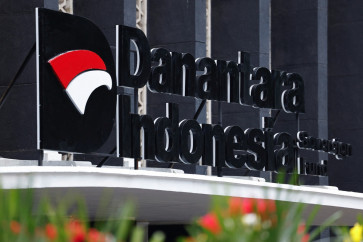Popular Reads
Top Results
Can't find what you're looking for?
View all search resultsPopular Reads
Top Results
Can't find what you're looking for?
View all search resultsBI to roll out new rule on hedging
Bank Indonesia (BI) will roll out a new regulation on hedging mechanisms to provide legal certainty for the financial industry to carry out swap and forward activities
Change text size
Gift Premium Articles
to Anyone
B
ank Indonesia (BI) will roll out a new regulation on hedging mechanisms to provide legal certainty for the financial industry to carry out swap and forward activities.
The central bank will stipulate that hedging activities are 'normal business transactions in the currency market', according to BI deputy governor Perry Warjiyo.
'We already have monetary instruments, such as swaps and forwards. Meanwhile, we also have macro-prudential regulations related to hedge risk management in banking business supervision. The new regulation will clarify the existing rules with detailed procedures,' he said at BI headquarters in Jakarta on Friday.
Perry said that customers' exports, imports and external or foreign debt could be used as collateral for swap and forward transactions.
Hedging is expected to help businesses with their foreign debt payments, as it will set certain values for the rupiah against foreign currencies, thus reducing uncertainties in foreign exchange (forex) volatility and any unwelcome surge in payments.
By using swaps, the parties involved agree to exchange one currency with another at a specific exchange rate. With forwards, the parties are obliged to carry out the exchange after a certain time period using an earlier specified rate. Meanwhile, according to BI data, the central bank has so far reaped more than US$4 billion from its forex swap, which was launched in July.
BI's plan came a week after the State-owned Enterprises Ministry issued a ministerial decree on hedging among state-owned firms. The firms are now allowed to create their own standard operating procedures in an effort to hedge their foreign currency exposure, whether of foreign debts or import financing, especially after the rupiah suffered depreciation against the US dollar.
Oil and gas firm PT Pertamina, for example, reportedly needs $150 million a day to finance its transactions, while utilities company PT Perusahaan Listrik Negara (PLN) requires around $20 million daily for its transactions.
Previously, the state-owned firms were prohibited from carrying out hedging under a regulation issued during the 2008 financial crisis due to fears that it could result in state losses.
Meanwhile, even though the rupiah appreciated by 0.9 percent this week, it remains one of Asia's worst-performing currencies so far, having depreciated 17.2 percent year-to-date against the US dollar.
The Jakarta Interbank Spot Dollar Rate showed that the rupiah stood at 11,556 against the US dollar on Friday, weakened from its previous level of 11,535 recorded a day before.
Separately, Bank Mandiri commercial and business banking director Sunarso, who goes by one name, said that most of the bank's private customers were already carrying out swap and forward activities in an effort to manage their foreign debt payments.
He acknowledged that its state clients had been reluctant to follow in the footsteps of private companies. 'But we believe that once they realize the importance of hedging, they will carry out the activities to support their businesses,' he said.










